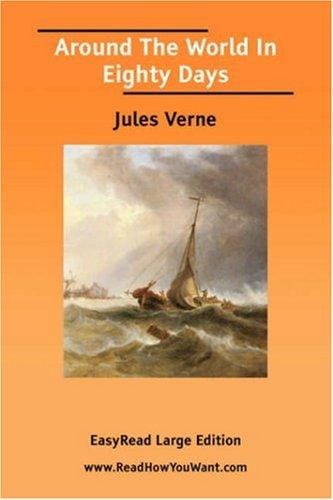Around The World In Eighty Days: Adventure, Innovation, and Timeless Charm
Explore Jules Verne’s classic Around the World in Eighty Days, its plot, themes, characters and enduring influence on travel and popular culture.

Introduction: A Race Against Time
Published in 1873, Jules Verne’s "Around the World in Eighty Days" remains a touchstone of adventure fiction. The novel follows the impeccably punctual English gentleman Phileas Fogg, who wagers that he can circumnavigate the globe in just eighty days. What unfolds is a whirlwind journey that blends audacious travel, emerging technology, and the universal thrill of beating the odds. For more than a century, readers have been captivated by Verne’s foresight and his celebration of curiosity, courage, and global connection.
Plot Synopsis: Steamers, Railways, and Elephant Rides
The story begins at London’s Reform Club, where Fogg abruptly stakes half his fortune on the daring proposal. Accompanied by his loyal valet, the quick-thinking Frenchman Passepartout, Fogg departs that very evening. Their meticulously planned itinerary runs from France to Egypt, India, Hong Kong, Japan, the United States, and finally back to England. Delays, storms, and sabotage threaten the schedule at every leg, while Scotland Yard detective Fix hounds the party under the mistaken belief that Fogg is a bank robber.
From rescuing the widowed Aouda from a forced sati in India to battling Sioux warriors on an American train, the travelers face dangers that would upend any ordinary tourist. Yet Fogg’s calm calculation and Passepartout’s improvisation repeatedly pull victory from disaster. In one of literature’s most satisfying twists, Fogg appears to lose the bet by a margin of minutes—only to discover he has gained a day by traveling eastward across time zones, winning both the wager and Aouda’s heart.
Main Characters: Precision Meets Panache
Phileas Fogg
Fogg epitomizes Victorian rationalism. He is methodical, financially secure, and seemingly detached from emotion. However, his willingness to risk everything on a bold idea reveals an undercurrent of passion.
Passepartout
The valet is exuberant, impulsive, and relentlessly loyal. Passepartout provides comic relief and human warmth, while his street-smart ingenuity balances Fogg’s rigid logic.
Aouda
Rescued in India, Aouda evolves from a damsel in distress into a perceptive partner who reveals a softer side of Fogg. Her presence introduces romance without derailing the adventure.
Detective Fix
Fix represents institutional suspicion and colonial authority. His dogged pursuit injects tension, while his eventual remorse underscores the story’s moral emphasis on honor and fairness.
Key Themes: Technology, Time, and Trust
Verne wrote at a moment when industrial advances were shrinking the planet. Steamships, transcontinental railways, and the newly laid telegraph cables form both the backdrop and engine of the plot. The novel champions technological optimism, suggesting that human ingenuity can dissolve vast distances.
Time itself becomes a character. Every missed connection or clever shortcut is tallied against the unforgiving clock. Simultaneously, the journey underscores that time is relative; cultural moments unfold at varied tempos around the world, and the International Date Line delivers the climactic twist.
Underlying the action is a meditation on trust: Fogg trusts schedules, Passepartout trusts his master, Aouda trusts her rescuers, and even Fix ultimately trusts the truth. The story argues that faith—in people and progress—can unite disparate cultures.
Historical Context: The World in 1873
When Verne penned the tale, the Suez Canal was barely four years old, and the transcontinental railroad had stitched the United States together just four years earlier. Telegraphy enabled near-instant communication across continents. Verne extrapolated these breakthroughs into an itinerary that seemed barely possible yet tantalizingly within reach. His imaginative leap mirrored public fascination with global expositions and illustrated newspapers that brought exotic locales into European parlors.
Cultural Impact: From Stage to Screen
"Around the World in Eighty Days" has inspired a dizzying array of adaptations. The 1956 film starring David Niven won five Academy Awards, including Best Picture. In 2021, a lavish television series reintroduced Fogg to a new generation, emphasizing diverse casting and ecological awareness. The story has spawned board games, theme-park rides, and even real-life reenactments by intrepid travelers and fundraising charities.
Phileas Fogg has become shorthand for audacious globetrotting, while Passepartout’s name graces cafés and hostels from Paris to Phnom Penh. The novel also anticipated the modern travelogue, blending reportage with narrative flair. Bloggers, podcasters, and YouTubers still structure epic trips around the eighty-day benchmark, proof of the tale’s evergreen appeal.
Travel Lessons for Modern Readers
Although most twenty-first-century itineraries rely on budget airlines rather than coal-fired steamers, Verne’s insights remain surprisingly practical. Preparation matters, but so does flexibility; Fogg’s rigid schedule would have failed without daring detours. Cultural sensitivity, embodied by the rescue of Aouda and respectful encounters with locals, is critical to meaningful travel. Finally, the book champions sustainable pacing—seeing the world is not only about speed but about savoring diverse experiences along the route.
Why the Novel Still Resonates
At heart, "Around the World in Eighty Days" is a celebration of possibility. In an era of geopolitical uncertainty, its optimism about cooperation across borders feels refreshing. Fogg’s gamble suggests that calculated risk can be life-affirming, while Passepartout’s openhearted curiosity models the joy of discovery. Readers today, bombarded by instant information yet craving authentic connection, find inspiration in a story that marries precision with wonder.
Conclusion: A Timeless Ticket to Adventure
Jules Verne’s classic continues to invite us aboard for an exhilarating ride through geography, technology, and the human spirit. Whether you’re a student exploring Victorian literature, a traveler charting your next expedition, or simply a dreamer hungry for escapist storytelling, "Around the World in Eighty Days" promises—and delivers—an unforgettable journey.



